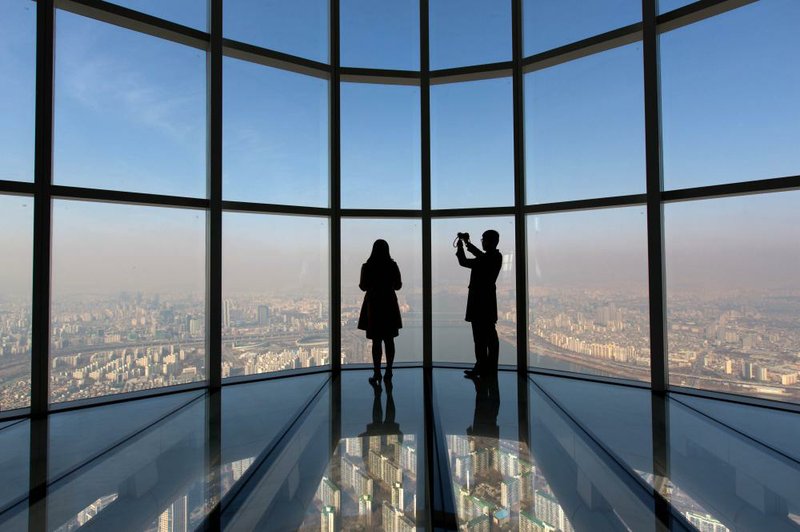The glass-bottomed observation deck sitting 118 stories up in the Seoul, South Korea, sky isn't for the faint of heart. That condition would apply to the tower's builder, the Lotte Group, as well.
After almost seven years of planning and $3.6 billion in spending, the conglomerate is preparing to unwrap its Lotte World Tower to the public. The building boasts some record-setting amenities: highest glass floor at the top of a building and highest swimming pool.
Yet the debut couldn't come at a worse time for Lotte, the family-owned conglomerate with $81 billion in revenue that may be the latest victim of what's called the "skyscraper curse." The empire's 94-year-old founder and three of his children face corruption charges, and its stores are at the epicenter of Chinese consumer retaliation for a U.S. missile-defense system being installed on land it donated.
"Lotte is kind of the perfect storm in terms of vulnerability," said Andrew Gilholm, Shanghai-based principal and director of analysis for Greater China and North Asia with Control Risks. "They're in sectors that are very exposed."
And that's more bad news for South Korea, which is being pummeled by concurrent political and economic crises. Park Geun-hye was impeached as president over a corruption scandal that has produced about 40 indictments, and she was questioned by prosecutors last week for the first time after losing her immunity.
The investigation ensnared Jay Y. Lee, de facto head of the country's biggest conglomerate, Samsung Group. The billionaire was jailed after being indicted on corruption charges. He has denied wrongdoing.
What was once the country's biggest container shipping company, Hanjin Shipping Co., declared bankruptcy last year, and Daewoo Shipbuilding & Marine Engineering Co., the world's biggest maker of ships, announced March 15 its fourth straight annual loss.
"Korea is definitely facing a lot of difficulties at home and abroad," said Emily Dabbs, economist with Moody's Analytics in Sydney. "Over the next year, we are going to see a low-growth environment."
Record-setting skyscrapers and economic hard times are no strangers, said Andrew Lawrence, Hong Kong-based founder of Oculus Research Asia and creator of the Skyscraper Index.
New York's Empire State Building debuted in 1931 during the Great Depression; work on Malaysia's Petronas Towers finished during the Asian financial crisis of the late 1990s; and Dubai's Burj Khalifa opened in 2010 as the property market there collapsed.
"Most of the skyscrapers are conceived in the up-cycle and completed in the recession, putting significant pressure on the companies that have built them," said Lawrence, who proposed the index for buildings of record height in 1999.
The relationship between skyscrapers and recessions has been named the "skyscraper curse" by Mark Thornton, senior fellow at the Mises Institute in Auburn, Ala. Lotte's 123-story tower got a taste of that misfortune last week, when the conglomerate said the scheduled Wednesday opening of the observation deck would be delayed until at least April 3 after an elevator malfunction.
Lotte faces other troubles too. The group's chairman, Shin Dong-bin, and three other family members went on trial last Monday on charges ranging from embezzlement to fiduciary breaches amounting to about $249 million.
The defendants include the group's founder, Shin Kyuk-ho, who first proposed the Lotte World Tower about 30 years ago. The family members deny the charges.
The group's then-vice chairman, Lee In-won, was found dead in August, just hours before he was scheduled to be questioned by prosecutors investigating allegations of slush funds, embezzlement and tax evasion at the group.
The court set a hearing Monday for Shin Dong-bin and Lotte executives in the trial, which may last months before a verdict is reached. A hearing date for other family members will be set later.
As the legal troubles grind on, South Korea's government is trying to help. The trade minister raised the issue of China's retaliation against the tourism and retail sectors with the World Trade Organization, Kang Myung-soo, director-general of the Trade Ministry's trade cooperation bureau, said by text message last Monday.
Still, the economic repercussions could get worse in the short term since Lotte and other Korean companies have limited ability to resist Chinese pressure. China says the missile shield called Thaad will break the regional strategic balance and wants it withdrawn.
"There's more to come," Gilholm said. "China's position is very, very clear, and they haven't gotten what they want."
Information for this article was contributed by Jiyeun Lee of Bloomberg News.
SundayMonday Business on 03/26/2017
